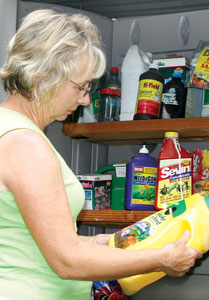New program targets recycling of pesticides
By Steve Herring
Published in News on August 27, 2008 1:52 PM
Violet Goodson of Mount Olive enjoys working with the plants in her yard and tries to be mindful in her use of pesticides. Nevertheless, she still worries about the environmental impact of those chemicals and the lack -- until now -- of a safe way of disposing of the chemicals and their containers.
A new county recycling program in place for the past several weeks allows Wayne County residents to dispose of those unwanted containers -- empty or not -- at no cost at the Dudley landfill located off Durham Lake Road. Such items may include containers for fertilizer, insecticides, herbicides, spray cans or dust for fire ants.

News-Argus/Steve Herring
Violet Goodson of Mount Olive checks some of the old pesticide containers in a storage area at her home.
"I just think it is great that they are making it easier for us to dispose of these things," Mrs. Goodson said. "We are becoming more conscious of the environment, I know that I am and I want to do the right thing."
In prior years, the county offered residents the opportunity to bring in the containers every other year. The new program offers a permanent collection site.
The state has provided an 8-by-40-foot partitioned cargo container. One side will hold empty, triple-rinsed original-labeled containers. The other side will hold containers that still contain chemicals. The containers can be no larger that five gallons.
"It is all for Wayne County, but it is not for commercial businesses," said Simone Cato, Wayne County recycling coordinator. "It is strictly for people in Wayne County. People will have to show a driver's license or utility bill stub showing proof of residency. Also, we are only accepting original containers that are with their labels."
Mrs. Goodson said she does not use a lot of pesticides and that some of the containers in her storage shed have been there for years because she didn't know of a way to dispose of themproperly.
"I will take advantage of the new service and I hope that other people will, too. That is great. I am glad to hear it," she said.
Gene Mercer of Mount Olive agreed.
"I definitely will use it (recycling). I abandoned use of some chemical because I am scared of them. I needed a way to get rid of them and did not know how to and I did not want to put them in the garbage. This is wonderful for citizens and good for the farmers."
Shaking a nearly empty container, he added, "This is empty and the man who helps me in the yard asked me what are we going to do with it. This plastic bottle, if it went into the landfill, it will last how long do they say, 500 years?"
Ms. Cato had been looking for grant applications for hazardous household waste recycling/disposal when she came across a Web site for the North Carolina Department of Agriculture and Consumer Services' Pesticide Disposal Assistance Program.
"We haven't done a lot with it (publicity) because we have been implementing so many other recycling programs," she said. "It has been getting out by word of mouth. The main thing we wanted to stress to the public is that the pesticide collection is permanent, not like our electronic recycling of the past where it was only offered say twice or three times a year.
"Then folks would feel like if they missed it that time they had missed out. This will be ongoing and will be open during our normal operating hours so folks will not have to wait for a particular date or time to bring in their pesticides."
The landfill is open Monday, Tuesday, Thursday and Friday from 7 a.m. to 5:30 p.m. and on Saturday from 7 a.m. to 5 p.m. It is closed on Sunday and Wednesday.
Ms. Cato said she expects most of the containers will come from households even though farmers, golf course operations and institutions, such as schools, also may participate in the recycling program.
Once the cargo container is filled, the state will remove the pesticides.
On those dates it will be possible for people to bring in unlabeled pesticide containers.
"At that point, we will know a date and time and work with homeowners to come down on that date because these are the experts who deal with it all the time as opposed to what we do," she said.
For now, the landfill will be the only site where the program will be available.
"It is secure and centrally located, but the program could be expanded over time," she said.
She added, "People tend to think it is just one item, but that one item multiplies in the population. A lot of times when we give a tour of the landfill people begin to understand versus looking at their own little garbage and thinking 'that is just one little garbage bag' but it adds up, it adds up.
Keeping the items out of the land fill is more than a question of protecting the environment, she said.
A new cell can cost millions of dollars, she said.
It is also important, she said, for people to be more aware of how they utilize pesticides. She some people tend to "overreact. We see three ants and we nuke the whole yard."
"It is not only the fact of keeping it out of the landfill," she said. "To start with when people purchase these items they should purchase the proper item. You do not want to use an insecticide when a problem needs a fungicide because it will not do anything for problem.
"So first all buy only what you need. Use it properly and use the least toxic product available."
